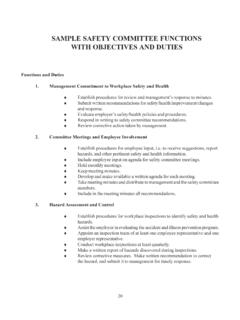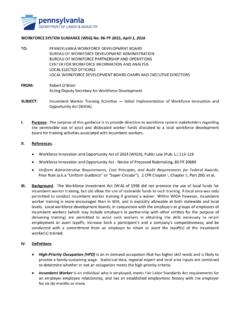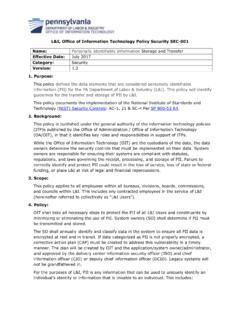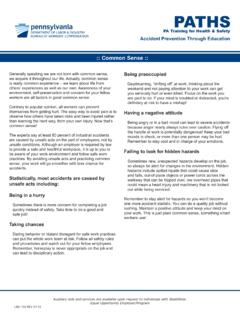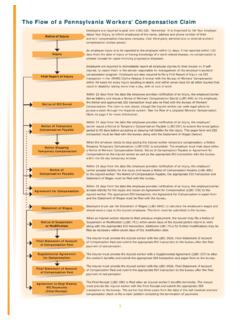Transcription of PA Workers’ Compensation Employer Information
1 PA Workers CompensationEmployer InformationThis is intended to provide Pennsylvania employers with general Information regarding their rights and duties under the state s workers Compensation Compensation (WC) is mandatory, Employer -financed, no- fault insurance which ensures that employees disabled due to a work-related injury or disease will be compensated for lost wages and provides necessary medical treatment to return them to the workforce. The workers Compensation system provides an exclusive remedy to employers and employees and is designed to simultaneously achieve the goals of safer workplaces, prompt Compensation and treatment of those it protects and reduced litigation costs to all parties.
2 PA WC Coverage Requirements The requirement to insure workers Compensation liability is mandatory for any Employer that employs at least one employee who: could be injured or develop a work-related disease in this state, or could be injured outside the state if the employment is principally localized in Pennsylvania, or could be injured outside the state, while under a contract of hire made in Pennsylvania, if the employment is not principally localized in any state, if the employment is principally localized in a state whose workers Compensation laws do not apply, or the employment is outside the United States and Canada, unless all employees are excluded from the provisions of Pennsylvania s workers Compensation laws.
3 Failure to Carry WC Coverage In the event an Employer is uninsured at the time an employee suffers a compensable work-related injury, the department will pursue reimbursement from the Employer of monies paid from the Uninsured Employers Guaranty Fund in relation to the claim. Reimbursement will include costs, interest, penalties, fees under section 440 of the Worker s Compensation Act and attorney fees. The department will also pursue prosecution against the uninsured Employer under section 305 of the Act. In addition, an uninsured Employer faces grave civil and criminal risks for failing to maintain continuous workers Compensation coverage.
4 Not only can the employee sue the Employer in tort for work-related injuries or diseases, in which suit the employee may recover amounts in excess of those allowed under workers Compensation , but the Employer and those individuals responsible to act on its behalf may each be criminally charged for each day s failure to maintain continuous workers Compensation coverage. Misdemeanor convictions can result in the potential imposition of a $2,500 fine and up to one year in imprisonment for each day the Employer is in violation of the requirement to maintain workers Compensation coverage. Felony convictions can result in the potential imposition of a $15,000 fine and up to seven years imprisonment for each day the Employer intentionally violated this requirement.
5 Further, the Employer and those individuals responsible to act on its behalf may be required to pay all benefits awarded by a workers Compensation judge. The Bureau of Workers Compensation investigates Employer compliance with workers Compensation laws and may initiate the filing of charges against employers and individuals responsible to act on its behalf if workers Compensation coverage is not continuously maintained. Further, any individual, including competitors, may seek county district attorney approval to file a private criminal complaint against an Employer who fails to maintain workers Compensation coverage when required to do so.
6 AssessmentsSection 1610 of the Workers Compensation Act authorizes the Department of Labor & Industry to assess an Employer $200 a day up to 30 days for failing to respond to the Department s request for Information regarding workers Compensation coverage. Municipality Building PermitsSection 302 of the act requires that a municipality shall require the Contractor to present proof of workers Compensation insurance or an affidavit that the contractor does not employ other individuals and is not required to carry workers Compensation insurance prior to issuing a building permit to a Notice An Employer is required by law to post, in a prominent and easily accessible place, at its primary place of business and sites of employment, a notice containing the name.
7 Address and telephone number of the insurer or other appropriate party to address regarding workers Compensation claims or to request Information . Insuring WC Liability An Employer may insure its workers Compensation liability: By purchasing a workers Compensation policy from the State Workers Insurance Fund (SWIF).Call SWIF at 2 Through an insurance the PA Insurance Department s website at for carriers approved to offer workers Compensation insurance in By securing Department of Labor & Industry approval to self-insure individually or as a Employer seeking approval to self-insure must submit its latest audited financial statements along with an application fee with each application.
8 Self-insured employers are required to set aside funds to pay workers Compensation claims and post security for future claims. Self-insured employers are also required to maintain an accident and illness prevention program as a prerequisite for retention of self-insured status and to file an annual program report with their renewal application. An Employer may also self-insure as a member of a certified group, which is restricted to businesses of a similar nature. For more Information on how to self-insure, contact the bureau s Self-Insurance Division at of WC InsuranceAn insured Employer is assigned a classification indicating the Employer s line of work.
9 Employer classifications are determined by the PA Compensation Rating Bureau, a non-government agency licensed and regulated by the PA Insurance Department. The Employer s basic premium is based on its classification code, the carrier s rate for the classification and the Employer s annual payroll. Insurance rates may vary so employers may want to contact several different authorized insurance carriers for Information on their rates. Employers Can Reduce WC Costs1. Develop a certified workplace safety with a functioning workplace safety committee, certified by the bureau, are eligible to receive a 5 percent annual workers Compensation policy premium discount.
10 2. Offer job openings to injured Employer is obligated by law to offer available jobs to its injured workers if the worker is capable of performing the Have a list of designated medical Employer may be relieved of its liability to pay for medical services rendered during the first 90 days of treatment if it posts a list of six or more health care providers (at least three of which must be physicians Page 3and no more than four of which may be coordinated care organizations), the list meets certain other legal requirements and the employee fails to treat with a medical provider on the list. The Employer is required to inform its employees in writing of their rights and duties regarding the provider list and to have employees acknowledge in writing that they understand those rights and duties.
